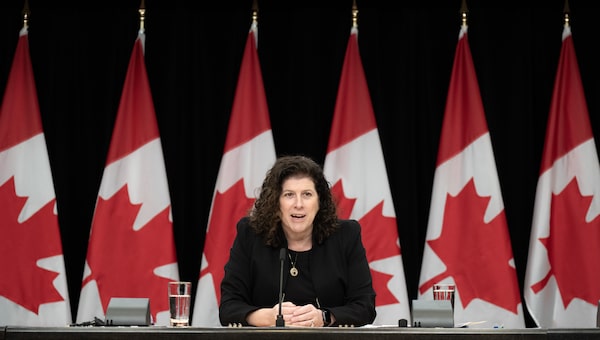
Auditor General Karen Hogan speaks about the ArriveCAN app during a news conference on Feb. 12, in Ottawa.Adrian Wyld/The Canadian Press
The federal government has referred three new cases of alleged contracting fraud to the RCMP and said further referrals can be expected as part of a continuing review of potential fraudulent billing by private contractors.
Officials described the situation to MPs as “time theft” involving cases where subcontractors are alleged to have billed multiple clients with direct government contracts for the same hours of work.
Meanwhile Auditor-General Karen Hogan told MPs that her office has launched an audit of federal incentives for Indigenous procurement.
Arianne Reza, the deputy minister of Public Services and Procurement Canada, appeared Wednesday with other officials – and Ms. Hogan – as part of a committee study into the government’s management of the ArriveCan app and other problems with how Ottawa spends billions of dollars each year on outsourcing.
Ms. Reza’s department announced in March that an internal review of federal contracting found nearly $5-million in allegedly fraudulent billing by three private subcontractors and the information was referred to the RCMP.
A fourth case was announced in July by the RCMP.
The deputy minister told the House of Commons public accounts committee that the total is now up to seven cases after three more were referred to the RCMP last month.
“It’s going to be something that is evergreen, ongoing,” said Ms. Reza of the review.
She did not name the subcontractors but said her department could provide the information to MPs at a later date. Other department officials told MPs that work is underway to recover the funds involved.
Assistant deputy minister Catherine Poulin said the cases being referred to the RCMP generally involve subcontractors.
“It’s individuals, so people, that through multiple contracts with multiple departments are concurrently billing the same hour of work,” she said.
“Which sounds like fraud,” said Conservative MP Kelly McCauley.
“Yeah, exactly,” Ms. Poulin replied.
Ms. Poulin and Ms. Reza said the prime contractors are generally not aware that their subcontractors are billing other contractors for the same hours of work. They said contractors are being urged to ensure they are actually receiving the work they pay for from subcontractors.
Mr. McCauley later questioned why these problems have not been found earlier.
“It just seems like a whole-of-government approach to being ripped off and poor oversight,” he said.
Both Ms. Reza’s department and the Canada Border Services Agency had responsibility for approving contracts related to ArriveCan – the government app launched during the height of the pandemic for cross-border travellers – and both departments have said they are conducting internal reviews.
The committee also heard from Ms. Hogan, who released a report on ArriveCan in February that was highly critical of the government’s management of spending on the app, which began as an $80,000 expense that eventually grew to about $59.5-million.
Ms. Hogan announced last month that her office is launching a new audit specifically focused on spending and contracts tied to GC Strategies, the two-person IT company that was the primary contractor on the app project.
Over the past 13 years, GC Strategies has received 105 government contracts with a combined total value of $100.3-million.
GC Stratgegies has been suspended from further federal contracts, along with two other companies that worked on ArriveCan – Coradix Technology Consulting and Dalian Enterprises.
Coradix and Dalian frequently worked together as a joint venture for the purpose of qualifying for contracts set aside for Indigenous businesses. Dalian was the Indigenous partner. Dalian founder David Yeo has said the company had just two employees and regularly relied on the larger Coradix for office services.
Public attention on Coradix and Dalian has led to broader scrutiny of how the federal government oversees the Procurement Strategy for Indigenous Business and joint ventures between Indigenous and non-Indigenous contractors.
The Assembly of First Nations told MPs in September that the majority of contract spending under the program is going to shell companies.
Ms. Hogan told MPs that her office has started work on an audit of that program and is aiming to publish a report in 2025 or 2026.
“It will depend on access to information and timing, but it’s in the works,” she said.